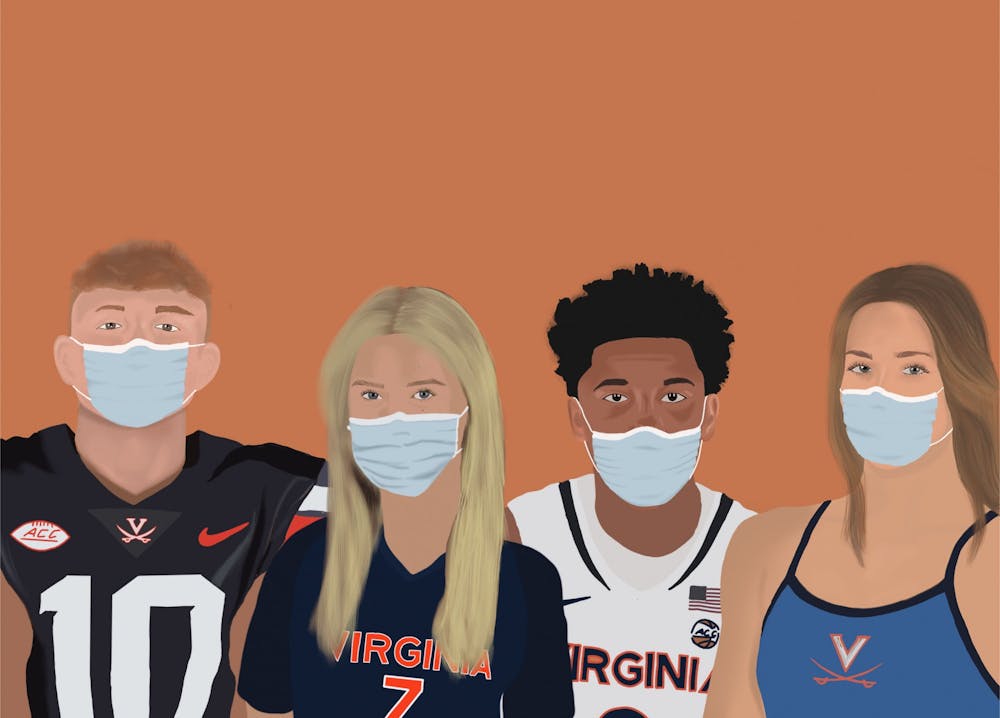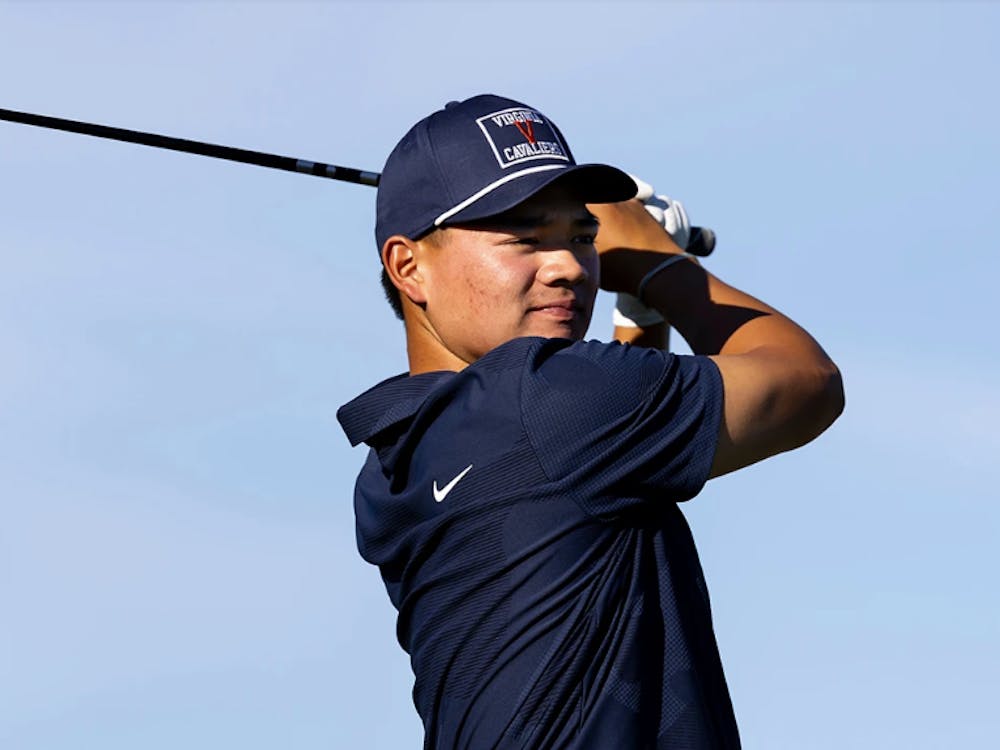Four weekly COVID-19 tests, complete isolation outside of the team, restriction from grocery stores, restaurants, salons and coffee shops — this was just the start of the heavy isolation student athletes felt throughout the 2020-2021 athletic seasons. The heat of the pandemic proved to be a pressing time for all as quarantine forced society into a state of loneliness when the world seemingly came to halt in March 2020.
When students returned to Grounds that fall, they were repeatedly asked to maintain the safety and health of peers, faculty and the Charlottesville community by following public health guidelines. For many, this seemed a little daunting — it took away the very essence of being at college. There were no packed sidewalks on the way to class, coffee shops filled with students or opportunities to socialize with a whole new world of people.
Beyond just the stress of going to class, wearing masks and maintaining a safe distance from others, imagine the stresses that arose with the expectation of playing a collegiate sport at the highest level in the midst of a pandemic.
“You’re so lucky to have a season,” many expressed to Virginia athletes as the ACC marched forward and held many sports seasons — athletes responded with a tired smile and bleak reply. For all athletes, last year presented challenges unlike anything anyone had experienced in the history of sports. The year required student athletes to dedicate themselves to their sports more than ever and avoid social engagement in a way that strained many athletes’ mental health.
The NCAA conducted a survey from Oct. 6 to Nov. 2, 2020 addressing heightened mental health concerns in student athletes. The survey reported rates of mental health concerns among student athletes were 1.5 to 2 times higher during the fall 2020 season than ever before in NCAA studies. This increase is immense and was just one initial insight into the insurmountable challenges still ahead.
The men’s basketball team experienced isolation in a more extreme manner than perhaps any other sport. The team was unable to live in dorms, see family members or socialize with peers for the duration of their season. The team’s vitality and ability to compete is indispensable for Virginia Athletics, and much of their athletic success lies at the heart of the athletic department. Their performance is also hugely important to fans, as Virginia basketball is one of the hallmark teams at the University.
Sophomore point guard Reece Beekman shared his own experience last year as a freshman on the men’s basketball team.
“It was a hard time and hard thing to go through — people can get homesick, and being away from my family for so long and not being able to see them, I really struggled,” Beekman said.
John Paul Jones Arena is known for its surging energy and packed stands, but the 2020-2021 men’s basketball season saw an eerie number of faceless seats in the arena due to COVID-19 restrictions prohibiting fans from attending games. The empty seats made it particularly difficult to stay motivated and focused during games and practices, Beekman said.
“We had to create energy through our teammates on the court that hometown fans usually give,” Beekman said.
Not only was energy lacking, but student athletes also felt detached from their peers and classmates on Grounds. Along with the struggles faced on the field, student athletes were forced to confront the same challenges affecting the student body as a whole.
“The atmosphere was missing and the energy around campus … we didn’t get to stay in dorms and meet the people you spend the next four years of your life with,” Beekman said. “It was tough.”
Alexa Spaanstra, senior forward and midfielder on the women’s soccer team, is known around Grounds for her athletic triumphs. She was named Female Rookie of the Year at the 2019 Hoos Choice Awards and most recently made First-Team All-ACC in the 2020-2021 season.
But for Spaanstra, COVID-19 changed much of what playing collegiate soccer looked like.
“During my first year, college looked completely different than it did during [COVID-19],” Spaanstra said. “It was carefree and you had nothing to worry about … During [COVID-19], there was so much uncertainty [about] when we were going to practice, if we had enough people available to practice or just how many players or coaches were going to be at practice.”
Despite the difficulties COVID-19 caused, Spaanstra recognized that it strengthened connections and trust both on and off the field.
“Although there were a lot of negative aspects that came with [COVID-19], something that I really appreciated is that it brought our team closer together,” Spaanstra said. “Being in a bubble in the NCAA Tournament for over a month, we were with each other every minute of the day. I think that this really strengthened our relationships off the field that allowed us to perform even better on the field.”
Additionally, Spaanstra was thankful for the ways she felt the athletic department helped her and the women’s soccer team navigate COVID-19.
“I think that the athletic department did a really good job making me feel safe by regulating [COVID-19] tests every other day,” Spaanstra said. “The ACC was very fortunate to allow us to have a season during the fall, and U.Va. did a really good job on keeping us healthy to perform to our best ability during this difficult time.”
The onset of the Virginia Athletic departments COVID-19 testing began in July of 2020 prior to the fall 2020 sports season. As recorded at the beginning of May 2021, the department had administered 34,583 tests — following the ACC guidelines requiring three molecular (PCR) tests each week before competition. Testing through May 2021 found a positivity rate of 0.6 percent among Virginia athletes and athletic staff.
Mental health was one of the sports psychology department’s primary focuses during this time, and the resources it invested in to provide student athletes with the ability to compete in the safest environment possible was impressive. Socially distanced trivia nights, Zoom sessions with members of the sports psychology department and Student Athletic Advisory Committee game nights were some of the ways the department kept the Cavaliers connected and supported.
This investment in not only the athlete, but the person, proved successful. Though it could not alleviate all of the pressures of the pandemic, the commitment to community led many of Virginia’s teams to see great triumphs during a difficult time. Ultimately, despite obvious challenges and hardships that COVID-19 gave rise to, the Cavaliers persevered — winning the NCAA Championship in men’s lacrosse, women’s swimming and diving, Michaela Meyer’s win in the 800-meter track and field event and Emma Navarro’s win in women’s singles tennis represented only a handful of the incredible successes seen by Virginia athletes last year.
Off the field, the strength demonstrated by student athletes while navigating a year of isolation created an impressive attitude of determination that will undoubtedly remain rooted in the foundation of Virginia Athletics for years to come.
With vaccination rates among students topping 96 percent, the return to in-person learning and Grounds buzzing with energy, there is no doubt that the Cavaliers are poised for success this year. After the hardships faced during the pandemic seasons, Virginia student athletes are returning stronger than ever with a new perspective on what it means to compete and represent the University. Student athletes now have a new layer of resilience that will prove crucial as Virginia marches forward in its pursuit of athletic excellence.







